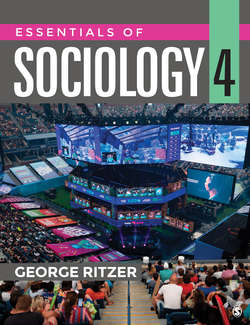Читать книгу Essentials of Sociology - George Ritzer - Страница 160
На сайте Литреса книга снята с продажи.
Status and Role
ОглавлениеStatus and role are key elements in the interaction order, as well as in the larger structures in which such interactions often exist. A status is a position within a social system occupied by people. Within the university, for example, key statuses are professor and student. A role is what is generally expected of a person who occupies a given status. Thus, a professor is expected to show up for class, to be well prepared, to teach in an engaging manner, and so on. For their part, students are also expected to attend class, to listen and sometimes to participate, to avoid texting and checking their social media during class, to complete the required assignments, and to take and pass examinations.
The concept of status can be broken down further into ascribed and achieved status. An ascribed status is one that is not chosen; it is beyond the individual’s control. It involves a position into which the individual is placed or to which he or she moves, regardless of what that person does or the nature of his or her capacities or accomplishments. In some cases, individuals are born into an ascribed status—for example, the status associated with race, ethnicity, social class, sex, or gender. In contrast, an achieved status is a position a person acquires based on accomplishment or the nature of the individual’s capacities. It may be based on merit or earned, or the person may choose it—for example, by seeking out and finding someone who will be a mate for life. Spouse, parent, and career as a “successful” entrepreneur are all achieved statuses. In addition, adults can achieve improvement in their social class or socioeconomic status (children’s social class is almost always ascribed).
Whether ascribed or achieved, a status can become a master status, or a position that is (or becomes) more important than any other status, both for the person in the position and for all others involved. A master status will become central to a person’s identity, roles, behaviors, and interactions. Primary examples of master statuses are those associated with race, disability, gender, and even sexuality.
The social roles connected with any statuses can be congruent; that is, the expectations attached to a given status can be consistent. Student status (achieved) may have role expectations of attending class and doing homework outside of class. But roles can also come into conflict—for example, going to class and keeping up with your social life. Role conflict can be defined as conflicting expectations associated with a given position or multiple positions (Merton 1957; Schmidt et al. 2014). A professor who is expected to excel at both teaching and research can be seen as having role conflict. Devoting a lot of time to research can mean that a professor is ill prepared to teach her classes. Or a professor may be torn between the expectations of being a teacher (preparing for class) and those of being a parent (playing with her children). A student may need to deal with the role conflict between being a student and studying and being a friend who spends the evening helping a close acquaintance deal with a personal problem.
Much research has been done on the role conflicts experienced by workers with domestic obligations. Each role interferes with the individual’s ability to satisfactorily meet the expectations associated with the other role (Moore 1995). Research has supported this idea. For example, women who work outside the home, who still tend to be responsible for the care of children and the home, experience higher levels of stress and poorer physical health than do working men (Gove and Hughes 1979; Pearlin 1989; Roehling, Hernandez Jarvis, and Swope 2005). The heavy burden of the female caretaking role inhibits women’s ability to fulfill their role as caretakers of themselves.
Another role-related problem is role overload, in which people are confronted with more expectations than they can possibly handle (Mathews, Winkel, and Wayne 2014). Students during final exams week are often confronted with role overload in trying to satisfy the expectations of several professors and courses. One study of the American “time crunch” and mental health suggests that feeling under time pressure is likely the active ingredient in role overload, which in turn affects people’s psychological well-being (Roxburgh 2004).
There is a tendency to see roles as fixed, unchanging, and constraining. However, people do have the ability to engage in role making. That is, they have the ability to modify their roles, at least to some degree (Turner 1978). Thus, the professor in the previous example might take her child to the office so that she can perform parent and teacher roles simultaneously. Researchers have noted that parents adopt a variety of strategies to reduce work–family conflict (Kelly et al. 2014; Minnotte and Minnotte 2018). Examples of such strategies include reducing work hours, turning down promotions, and negotiating trade-offs with one’s partner.
